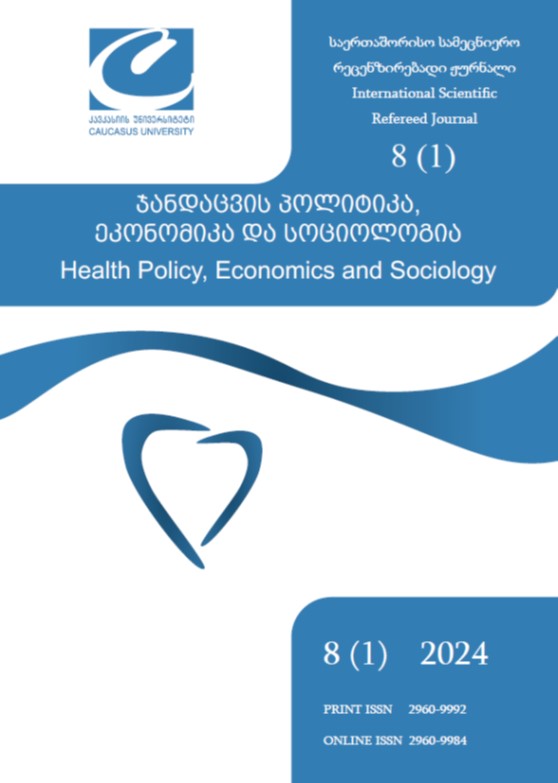მედიცინის სფეროში ხელოვნური ინტელექტის დანერგვა
DOI:
https://doi.org/10.52340/healthecosoc.2024.08.01.08საკვანძო სიტყვები:
სამედიცინო ტექნოლოგიები, მედიცინა, ChatGPT, Med-PaLM, სამედიცინო ალგორითმები, ხელოვნური ინტელექტიანოტაცია
ხელოვნური ინტელექტი გულისხმობს კომპიუტერებისა და ტექნოლოგიების გამოყენებას ადამიანის მსგავსი ინტელექტუალური ქცევისა და კრიტიკული აზროვნების სიმულაციისთვის. ამერიკელმა მეცნიერმა ჯონ მაკარტიმ პირველად აღწერა ტერმინი ხელოვნური ინტელექტი 1956 წელს, როგორც ინტელექტუალური მანქანების შექმნის მეცნიერება და ინჟინერია. ინგლისელი მათემატიკოსი ალან ტიურინგის მიერ შექმნილ „ტიურინგის ტესტი“ ეფუძნებოდა იმ იდეას, რომ კომპიუტერის ინტელექტუალურმა ქცევამ კონკრეტული სააზროვნო ამოცანები უნდა გადაჭრას ადამიანის მსგავსად. 1980-1990-იან წლებში ხელოვნური ინტელექტის მიმართ ინტერესი გაიზარდა სხვადასხვა სამეცნიერო მიმართულებაში, მათ შორის ჯანდაცვის სფეროშიც. 2016 წელს ხელოვნური ინტელექტის კვლევაში ყველაზე მეტი ინვესტიცია ჯანდაცვის მიმართულებით განხორციელდა. მედიცინაში ხელოვნური ინტელექტი იყოფა ვირტუალურ (მაგ., ელექტრონული ჩანაწერები) და ფიზიკურ (მაგ., ქირურგიული რობოტები) ქვეკატეგორიებად. ხელოვნური ინტელექტი დიაგნოზს ქმნის ფლოუჩარტებისა და მონაცემთა ბაზაზე დაფუძნებული სიღრმისეული სწავლების მეთოდებით. ხელოვნური ინტელექტი ასევე ეხმარება ექიმებს პაციენტების დიაგნოსტიკაში, პროგნოზირებასა და ჩანაწერების ორგანიზებაში. მოდელები, როგორებიცაა ChatGPT და Med-PaLM, აუმჯობესებენ დიაგნოზის დასმის სიზუსტეს და მკურნალობის ეფექტიანობას. ნაშრომი მიმოიხილავს ხელოვნური ინტელექტის დანერგვას მედიცინაში, მის დადებით და უარყოფით მხარეებს.
წყაროები
• Amisha, Pathania, M., & Rathaur, V. K. (2019, July). Overview of artificial intelligence in medicine. J Family Med Prim Care, 8(7), 2328-2331. doi:10.4103/jfmpc.jfmpc_440_19. PMID: 31463251; PMCID: PMC6691444.
• Basu K, Sinha R, Ong A, Basu T. Artificial Intelligence: How is It Changing Medical Sciences and Its Future? Indian J Dermatol. 2020 Sep-Oct;65(5):365-370. doi: 10.4103/ijd.IJD_421_20. PMID: 33165420; PMCID: PMC7640807.
• Bogoch L, Watts A, Thomas-Bachli A, Huber C, Kraemer MUG, Khan K. Pneumonia of unknown aetiology in Wuhan, China: Potential for international spread via commercial air travel. J Travel Med. 2020;27:2020:taaa008. [PMC free article] [PubMed] [Google Scholar]
• Clark L, editor. Google's Artificial Brain Learns to Find Cat Videos. Wired UK Science. 2012 Available from: http://www.wired.com/2012/06/google-xneural-network. [Google Scholar]
• Dilsizian S, Siegel E. Artificial intelligence in medicine and cardiac imaging: Harnessing big data and advanced computing to provide personalized medical diagnosis and treatment. Curr Cardiol Rep. 2014;16:2014. [PubMed] [Google Scholar]
• Driess, D., Schaekermann, M., Amin, M., Chang, P.-C., & Carroll, A. (2023). Towards Generalist Biomedical AI. New York: Cornell University.
• Esteva A, Kuprel B, Novoa RA, Ko J, Swetter SM, Blau HM, et al. (2018) Dermatologist-level classification of skin cancer with deep neural networks? Nature. 2017;542:115–8. doi: 10.1038/nature21056. [PMC free article] [PubMed] [Google Scholar]
• Greenfield, D. (2019). Artificial Intelligence in Medicine: Applications, implications, and limitations. Boston: Science in the News - Harvard Graduate School of the Arts and Sciences.
• Gulshan V, Peng L, Coram M, Stumpe MC, Wu D, Narayanaswamy A, et al (2016). Development and validation of a deep learning algorithm for detection of diabetic retinopathy in retinal fundus photographs. JAMA. 2016;316:2402–10. [PubMed] [Google Scholar]
• Hamlet, P & Tremblay, J. Artificial intelligence in medicine. Metabolism. 2017;69S:S36–40. [PubMed] [Google Scholar]
• James, T. A. (2023). How Artificial Intelligence is Disrupting Medicine and What it Means for Physicians. Boston: Harvard Medical School.
• Sinsky C, Colligan L, Li L, Prgomet M, Reynolds S, Goeders L, et al. Allocation of physician time in ambulatory practice: A time and motion study in 4 specialities. Ann Intern Med. 2016;165:753–60. [PubMed] [Google Scholar]
• Wei ML, Tada M, So A, Torres R. Artificial intelligence and skin cancer. Front Med (Lausanne). 2024 Mar 19;11:1331895. doi: 10.3389/fmed.2024.1331895. PMID: 38566925; PMCID: PMC10985205.
• Wilson, S. (n.d.). Artificial Intelligence in Medicine: Applications, implications, and limitations. Harvard Graduate School of the Arts and Sciences. Science in the News, Boston.
• Zohuri B, Behgounia F. (2021) “Artificial Intelligence and High Performance Data-Driven Medicine”, Aditum Journal of Clinical and Biomedical Research, 1(1); DOI: http;//doi.org/04.2021/1.1004.














